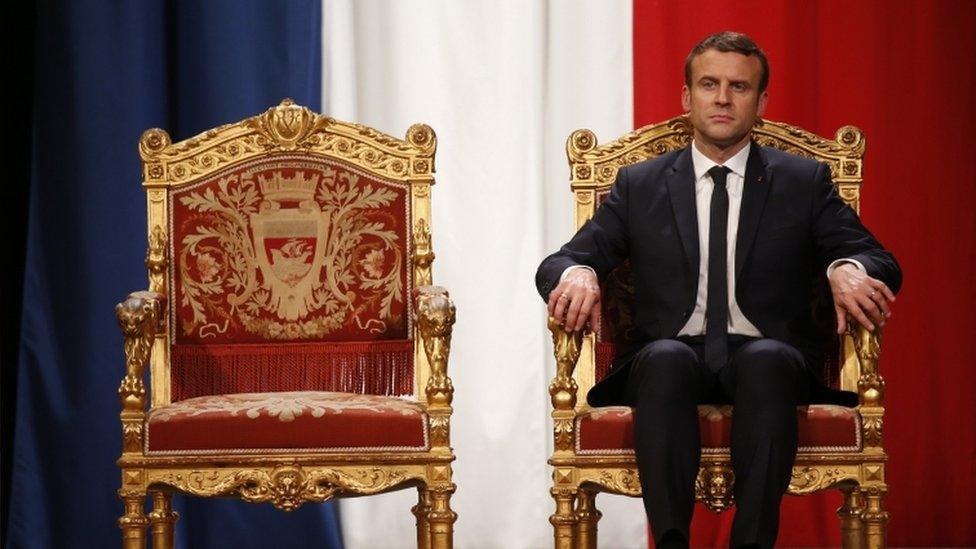Macron: Who's who in the French president's team?
- Published
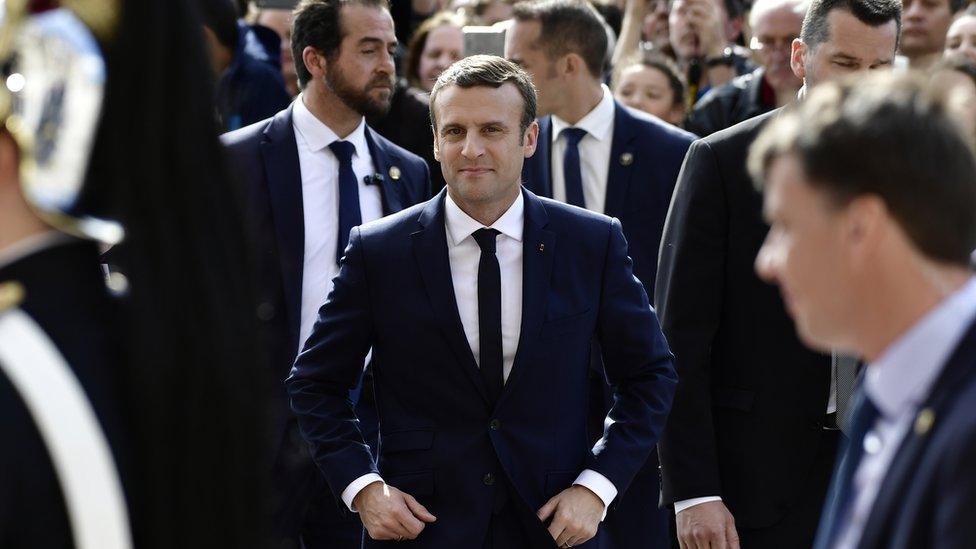
President Macron has chosen an equal number of men and women in his cabinet, with several figures from civil society
French President Emmanuel Macron's government consists of a centre-right prime minister and a cabinet made up of equal numbers of men and women.
Most of the big posts are held by men but everyone in the team is required to meet the test of "overcoming the divisions between right and left and embracing a progressive project", according to a spokesman.
The cabinet includes an Olympic fencing champion and a top haematologist.
Edouard Philippe, Prime Minister
Like the president, he graduated from the elite ENA college for France's top civil servants.
In 2002 he was actively involved in setting up the centre-right party led by Bordeaux Mayor Alain Juppé.
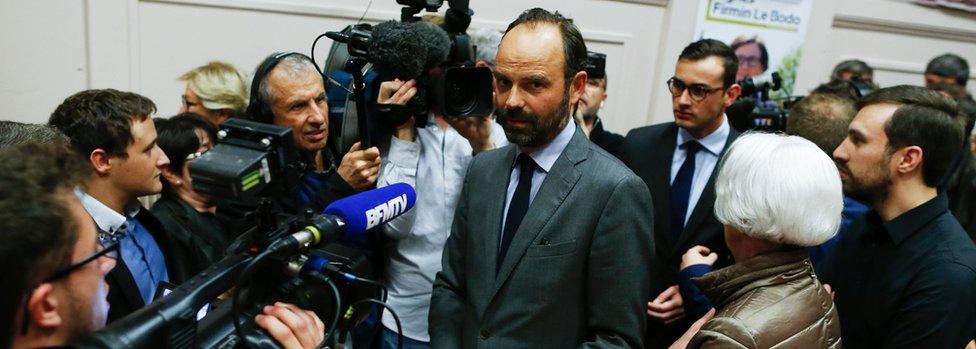
Mr Philippe has made unflattering remarks about the new president in recent months
For years he was seen as Mr Juppé's right-hand man, but left politics to take up a post in the private sector.
In 2010, he won the race to be mayor of the northern port city of Le Havre.
He backed Mr Juppé's unsuccessful bid to secure the centre-right presidential nomination in November 2016. Ten years before, he co-wrote a political novel with Gilles Boyer, who went on to run the Juppé campaign.
What has he said? "Who is Macron? For some, impressed by his seductive power and reformist rhetoric, he would be the natural son of (JF) Kennedy and (ex-French PM) Mendès France. That seems unlikely. The former had more charisma, the latter more principles. For others, he would be Brutus, Caesar's adoptive son."
France's cabinet: 11 men, 11 women
President Macron fulfilled a promise to balance his cabinet with as many women as men. Here are some of the key appointments.
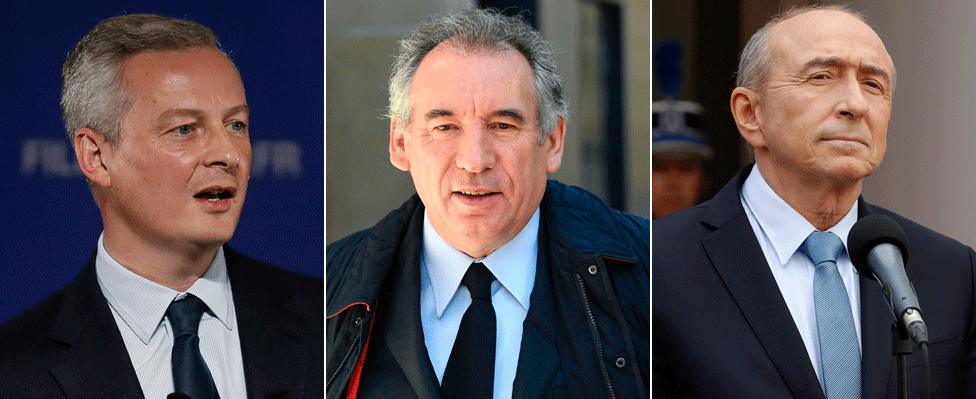
The appointment of (L-R) Bruno Le Maire, François Bayrou and Gérard Collomb showed the president's attempt to draw from the right, centre and left
Bruno Le Maire, economy minister: A right-winger, he was part of Nicolas Sarkozy's government and is said to have coveted the economy role for several years. He ran for the Republican presidential nomination but fared badly in the public vote. Another right-wing figure, Gérard Darmanin, gets the role of public accounts minister.
François Bayrou, justice minister: This centrist is no stranger to government, having served twice as education minister several years ago. He ran for the presidency three times but dropped out this year to throw his weight behind the Macron campaign. His intervention was seen as a turning point in the presidential race.
Gérard Collomb, interior minister: An early adopter of the new president, Mr Collomb was part of the Socialist party for decades. He was seen as instrumental in bringing François Bayrou into the campaign. He is the mayor of Lyon and has one of the toughest jobs in government, with France still under a state of emergency.
Jean-Yves Le Drian, foreign and Europe minister: Served President François Hollande loyally as defence minister and is one of only two survivors of the previous government. The other is radical leftist Annick Girardin. Mr Le Drian is regarded as quiet but effective.
Nicolas Hulot, ecology minister (resigned): An environmentalist opposed to nuclear energy, he was heavily involved in the COP21 climate change conference in Paris. In some ways his appointment was a surprise as he has in the past criticised Mr Macron for seeing green policies as an afterthought to free trade. On 28 August 2018 he quit the government on live radio, citing his frustration at the lack of progress on climate change and other environmental issues.
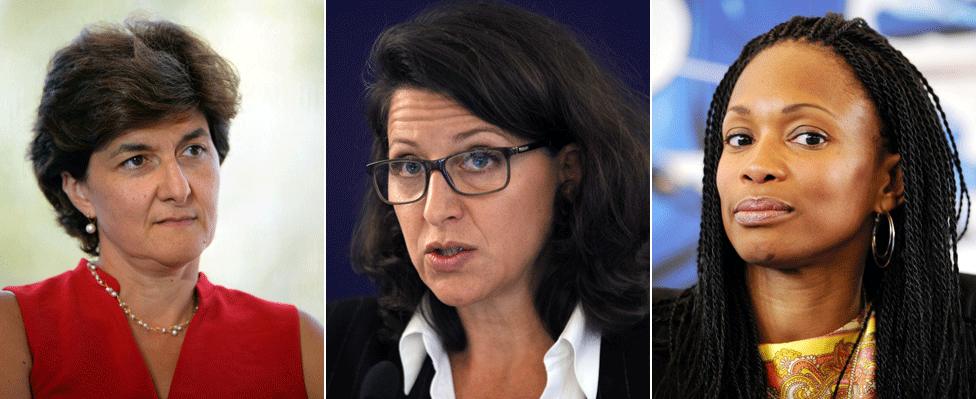
Among those picked for big posts were (L-R) Sylvie Goulard at defence, Agnès Buzyn at health and Laura Flessel as sports minister
Sylvie Goulard, defence minister: A Euro-MP, she has been part of Mr Macron's foreign affairs team for several months. She is a political colleague of François Bayrou, who aligned his centrist MoDem party with Mr Macron.
Agnès Buzyn, health minister: A well-known health professional, she has headed the haematology department at the Necker children's hospital in Paris as well as France's national cancer institute. Another figure from civil society, Sophie Cluzel, is given the role of disabilities minister. Her four children include a daughter with Down's Syndrome.
Laura Flessel, sports minister: A double Olympic fencing champion widely known in French sport.
Françoise Nyssen, culture minister: Born in Belgium, she worked for the Belgian government for several years in urban planning before moving into publishing in France.
Murielle Pénicaud, labour minister: No stranger to the labour ministry, where she worked in the early 1990s, Ms Pénicaud has been head of the Business France agency with the aim of attracting foreign investment.

Campaign team
Two members of the new cabinet were an integral part of the Macron presidential campaign team.
Richard Ferrand, minister for territorial cohesion: Also secretary general of Mr Macron's fledgling La République en Marche (Republic on the move) party.
Mounir Mahjoubi, junior minister for digital affairs: He ran the digital side of Mr Macron's presidential campaign but now has a high-profile post in government. President Macron has placed the digital economy as a high priority. His parents came to France from Morocco in the 1970s and he has been behind several start-up businesses in France.
Other key members of the Macron campaign include:
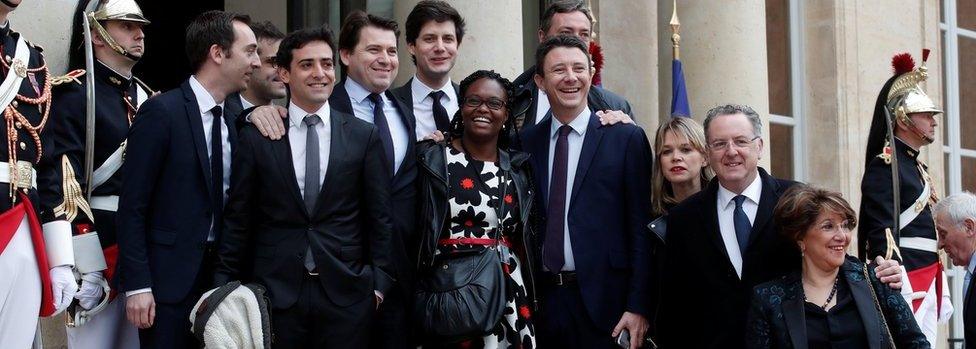
The new president's team entered the Elysée palace on Sunday
Alexis Kohler: Secretary-general at the Elysée, he has worked closely with Mr Macron for several years and has long acted as his special adviser. Described as the only close colleague Mr Macron really listens to, it was Mr Kohler who announced the choice of Edouard Philippe as prime minister.
Ismaël Emelien: Special adviser to the president, he is a long-time friend seen as one of his closest confidants. Seen as one of the main figures behind the creation of the En Marche movement, he was a former colleague of Mr Macron at the economy ministry.
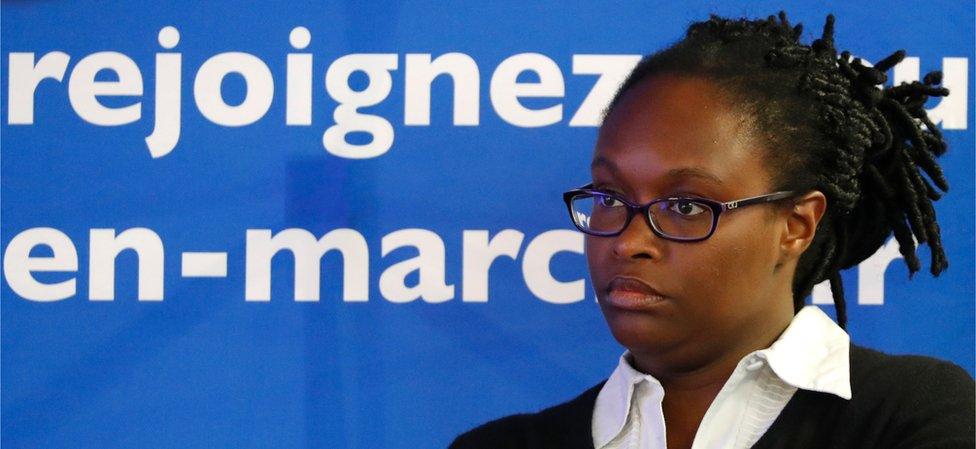
Sibeth Ndiaye is the communications chief at the Elysée
Philippe Etienne: Chief diplomatic adviser, currently ambassador in Berlin, who will have to pursue the president's agenda of reforming the EU.
Patrice Strzoda: In charge of the president's office and a highly experienced civil servant, who acted briefly as chief of staff for the outgoing prime minister.
Sibeth Ndiaye: Born in Senegal, and a mother of three, she ran the press relations side of his presidential campaign and now has the task of doing the same for his presidency. She only became a naturalised French citizen last year and played a starring role in a behind-the-scenes TV documentary on the Macron campaign.
- Published15 May 2017
